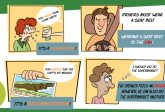What does eventually mean?
Have you ever had a friend who wasn’t really a friend? Someone who was there in the good times but never there in the bad times? Someone you thought you could rely on but in reality you couldn’t trust?
We call a person like this a fair-weather friend. Of course, it’s best to keep people like this at arms length.
Words can also be our friends! When learning a language we sometimes come across a word that sounds similar to a word in our own language. Very often these words have the same meaning – great! But sometimes the meaning of the two words can be quite different. We call these words false friends.
The word eventually is a false friend between the English language and several other European languages including French, German and Italian. So, what does the word eventually mean in English? This blog post looks at the word eventually and how to use it correctly in English.
What does eventually mean?
Many European languages have a word that is similar to the English word eventually. This comes as no surprise as the English language was heavily influenced by the German, French and Latin languages for over a thousand years. In the other European languages the word that looks and sounds similar to eventually has the meaning of probably.
However, in English the important thing to remember is:
Eventually does not mean probably.
So what does eventually mean in English? It means in the end or after some time. We use eventually to speak about the past or the future. Let’s look at some examples of both.
Eventually
- Eventually means in the end or after some time.
- Eventually does not mean probably or maybe.
Eventually - speaking about the future
When we use the word eventually to speak about the future, we are speaking about something that we know is going to happen. However, we do not know when it will happen.
For example, someone might say:
I will eventually learn to drive.
In this sentence, the speaker uses the word eventually because she is sure that one day she will learn to drive. However, she is not sure when she will learn to drive.
The word eventually is an adverb that follows the rule ‘after the first auxiliary verb’ when used in a sentence.
When we use eventually to speak about the future, we generally place it after the modal auxiliary verb will.
Here are some examples of sentences using eventually to speak about the future:
I will eventually go on holiday – I am not sure when.
Jane will eventually be promoted at work.
Marco will eventually speak fluent English.
The earth will eventually run out of oil.
I will eventually return to live in my home country.
In these sentences we use eventually because we want to communicate that we are sure that the action will happen but we are not sure when it will happen.
Eventually - speaking about the past
When we are speaking about the past, the word eventually means in the end or after all that. We often use eventually to talk about a situation in which we had to wait for a long time or to explain that something took a long time to happen.
For example:
Yesterday, Mark walked for 2 hours and he eventually arrived home at 11pm.
When we use the word eventually to speak about the past we generally put it before the main verb.
Here are some examples of eventually to speak about the past:
After 3 hours in the oven, the bread was eventually cooked.
Jane worked for 10 years before she eventually got a promotion.
Luke saved for 5 years and eventually bought a car.
The delivery man drove to seven different houses before he eventually found the right address.
Test Yourself
Learn to SPEAK English
Join a live online English tutor to get help with your English.
Individual and group classes with our expert teachers.
Eventually
Phrasal Verbs
To rely on:(1)To depend on: Example:Nowadays, we rely on technology to communicate.
(2)To put trust in: Example: I can always rely on my mum to make me feel better when I’m having a bad day.
Idioms
Fair-weather friend: Someone who is a friend during good times but not during difficult times.
Example: After I got divorced I realized that some of the people I knew were just fair-weather friends.
At arm’s length: At a distance to avoid being too close.
Example: I like my colleagues but I keep them at arm’s length. I try to keep my work life and my personal life separate.
Thank you for reading our post. You’ll find more English grammar tips elsewhere on our site and if you’d like information on our English courses in Dublin, please do not hesitate to contact us.




